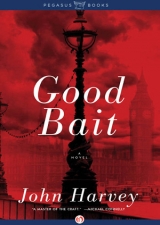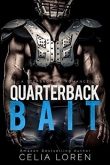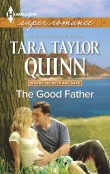
Текст книги "Good Bait"
Автор книги: John Harvey
Жанр:
Триллеры
сообщить о нарушении
Текущая страница: 11 (всего у книги 19 страниц)
32
She had read it somewhere: the smell of a slaughterhouse, blood and piss and shit and fear. The sweet bite of vomit at the back of the throat.
For a moment, she swayed, eyes glazed.
She had seen death before, too many times, but not like this.
She had to force herself to look again, to see.
Kebab shop, she thought. That’s what it reminded her of. A kebab shop, late at night: walking home, two, three in the morning, head furred and thick from too much vodka, too many cigarettes, the overlapping stink of sweet chilli sauce and slowly turning meat; the man behind the counter, bored, tired, wiping his fingers down the front of his filthy apron before slicing the meat into veinous, bloodied strips. Except that these slabs of scored meat, hanging from the aluminium struts of the roof, had arms and legs and heads; the latter barely recognisable, burned, gouged, torn.
Bile caught in her mouth and she held it there while her body juddered before swallowing it back down.
Her head swam.
The belly of the nearest man hung down in folds, half covering his shrivelled cock and balls.
‘Outside,’ Ramsden said quietly, close behind. ‘Talk outside.’
He touched her arm at the elbow; started, gently, firmly, to steer her towards the doors.
As Karen stepped through into the air, Scene of Crime officers turned aside.
The light bit at her eyes.
The parking area, surrounded on three sides by multi-level storage units, was busy with police vehicles, ambulances, unmarked cars.
Karen counted, slowly, one to ten inside her head.
‘What do we know?’ she asked.
‘Found by a delivery team from the airport. Come to collect a container, evening flight to Ankara. Poor bastards, got more than they bargained for.’
‘The bodies. Any idea how long they’d been there?’
‘Best guess so far, early hours.’
‘This morning?’
‘Be a sight worse, else.’
He gave it a moment, watching her eyes. ‘Security comes round every couple of hours. Two men usually, sometimes one.’
‘This morning?’
‘Just the one.’
‘Handy.’
‘Nothing noted in the log. Call out now for him to come back in.’
Karen looked up at the CCTV cameras attached to several of the buildings; another, mounted on a high stand, slowly revolving, centrally placed.
‘Funny thing,’ Ramsden said, following her gaze. ‘System went down, two thirty, thereabouts. This whole area. Malfunction. Didn’t get up and running till close on four.’
‘Coincidence?’
‘What’s that? An explanation waiting to happen? Don’t you soddin’ believe it.’
‘What then?’
‘Bloke in charge went off conveniently sick. A while before they could get someone else in to cover. Couple of uniforms, local, went round to his address. Nobody home. We’re still looking.’
‘Whoever worked them over,’ Karen said. ‘All that was done somewhere else. That’s what we’re assuming?’
Not really a question that demanded answering. Anything else, there would have been far more blood than there was: ceiling, walls, floor. And even there, that close to the airport, too great a risk of noise. Slow screams of a dying man. Three dying men. She realised she didn’t know exactly how they had died.
‘Two of them,’ Ramsden said when asked, ‘a bullet to the back of the head. Small calibre by the look of it, close range. After they’d been worked on, my guess, not before. Biggest of the three, apart from what’s been done to his face and hands, no obvious cause.’ He shrugged. ‘Maybe his heart just gave out.’
‘No way yet of knowing who they are?’
‘Not as yet. Once the computer guys get to work on the faces we’ll have a better idea what they looked like before all this. Run ’em through the system after that. See what pops.’
Nodding acknowledgement, Karen stepped away, slowly turned and looked up into the sky. A late plane, taking off, its lights curving gradually upwards into the night sky. Wherever it was heading, she wished she were on board, bound for wherever. Anywhere. Anywhere but here.
33
‘Croissant?’
‘What?’ Letitia’s voice was harsh, bruised by sleep.
‘Croissant? It’s a sort of curved doughy thing, a bit like-’
‘I know what a fucking croissant is.’
‘Good. Here. Have one.’ Cordon sat on the side of the bed, paper bag in his lap.
Letitia shook her head and, shuffling into a sitting position, pulled the pillows up against the headboard and leaned back. The sheet slipped as she twisted round, leaving one breast exposed. Outside, rain was falling lightly; you could hear it faintly against the shutters.
‘Where’ve you been anyway?’ she asked.
He held up the bag. ‘To get these.’
‘I didn’t hear the car.’
‘I walked.’
‘In this?’
He shrugged. ‘Live in Cornwall, remember? You get used to it.’
His hair had been darkened by the rain; shoes and waterproof jacket he’d taken off and left just inside the door. His idea had been to give himself time to think, think – what was the expression? outside the box? – but all he could see was the same set of imponderables, the same set of walls.
They’d taken the ferry from Portsmouth to St. Malo. Letitia’s father had driven them to the port and then continued on his way towards Bristol, old friends he hadn’t seen in far too long a time. The bookshop was locked up. A sign: Closed Till Further Notice. After what had happened, there would be people coming round, he didn’t doubt; more friends of Anton’s, asking questions, none too fussy about how they got their answers. One more consequence of Cordon’s actions.
‘Who in God’s name d’you think you are?’ Clifford Carlin had asked. ‘Shane? Sorting out the bad guys? Setting things to rights?’ Jack Schaefer. Alan Ladd in buckskins. One of Carlin’s favourites. Cordon’s, too.
‘Something like that,’ Cordon had answered. He was taller than Ladd, he knew that for a fact.
‘Great!’ Letitia had said when he told her what had happened at the caravan site. ‘You’re going to get us all fucking killed, you know that, don’t you?’
It was a risk, a possibility. Simply, he hadn’t seen what else he could do. He’d said as much to Jack Kiley when he called him later, explaining the situation, asking if there were any ways in which Kiley thought he could help.
‘What?’ Kiley had replied. ‘A couple of nights’ bed and board and suddenly I’m your guardian angel? Picking up the pieces?’
‘Sorry, Jack. Bit out of my depth.’
Kiley gave it some thought. ‘Letitia and the kid, they’ve got passports?’
‘I think so.’
Uncertain where they might go after the funeral, what they might do, Letitia had taken that precaution, at least.
‘What you’ve got to do,’ Kiley said. ‘Buy a little time.’
After arriving in France, they’d taken a bus into Dinard, as Kiley had instructed, just a little way west along the coast. A fading old seaside town, mostly closed down for the winter. Grand hotels on the seafront boarded up, shuttered across. Only the one cafe open on the promenade, where Letitia sat and smoked and read whatever paperbacks she’d bought on the ferry, while Cordon and young Dan played desultory games of football on the beach.
‘Be patient,’ Kiley had told them. ‘Sit tight. I’ll get back to you soon as I can.’
For some reason, there was a statue of Alfred Hitchcock peering out across the water, surrounded by stone birds. A casino under redecoration. They found a little place across from the art gallery that sold good pizzas and sat there for hours, sheltering from the wind, listening to the same music playing over and over.
Kiley phoned again on the third day. One of Jane’s friends at the school had a holiday place in Brittany, a village just a couple of hours’ drive from where they were. Not even a village, a hamlet. Four dwellings and only one of them occupied year round, an old man and his dog. They could stay there, till Easter if necessary. Sort out what they were going to do.
‘Might need your help there, too, Jack,’ Cordon said.
‘Tell me something I don’t know.’
Cordon hired a car and drove it as far as Lamballe where he changed it for another. If anyone was going to be on their trail, he wanted to make it as difficult for them as possible. At the Carrefour in Guingamp they loaded up with supplies; the nearest village, some three or four miles from where they would be staying, had a boulangerieand nothing else.
‘For Christ’s sake!’ Letitia exclaimed.
‘What?’
‘That bloody croissant. You’re getting crumbs all over the bed.’
‘Didn’t realise you were so fussy.’
‘Yeah, well …’
They heard the toilet flush and then Danny’s voice telling them it was raining. A moment later he appeared in the doorway, tousle haired, sleepy eyed, dinosaur pyjamas.
‘I’ll get the coffee on,’ Cordon said.
‘You do that.’
She lifted the covers and the boy slid in beside her, Letitia turning to slide an arm comfortably around him, kiss him on the forehead – ‘Why don’t you just snuggle down?’
Feeling a stranger, Cordon left the room.
It was a converted farmhouse, low and long, a longere, thick stone walls that had stood for more than a century. Brown shutters, red paint around the window frames starting to blister and fade. A garden front and back, gravel, lawn and shrubs. A few stunted apple trees. Other trees, taller, shielded the house from the road. Scots pine? Cordon wondered. Breton pine, perhaps? Was there such a thing? His father would have … he stopped the thought on hold.
Inside there were three bedrooms, a bathroom, a living room, a wide kitchen with a refectory table and a tap that permanently dripped. You could have fitted Cordon’s old Newlyn sail loft in twice with space to spare. No need for them to get under one another’s feet.
Letitia seemed to be in denial: whenever Cordon tried to get her to talk about what they were going to do, consider their options, ‘There are no fucking options,’ was the best he could get.
Letitia stayed in bed late, drank supermarket wine and cooked a few unwilling meals. Listened in a half-hearted fashion to the Madeleine Peyroux CD that had been left in the portable stereo. Without too much of an argument, she let Danny talk her into helping him do one of the several jigsaw puzzles he’d found in one of the cupboards, played hide-and-seek with him until that too palled and she ran her hand through his hair, kissed his cheek and begged for a rest. Time to do a little reading instead.
When she’d finished the Martina Cole she’d bought on board, she tried some of the books the owners had left around-Ian McEwan, Rose Tremain, Julian Barnes – but with limited success. Sometimes she just sat, collar hunched up, on a folding chair close to the front door of the house, smoking cigarette after cigarette and staring at the empty lane beyond the gate.
As far as Danny was concerned the whole thing was just a holiday, a place to run around; the owners clearly had kids of their own and there were toys in boxes, DVDs of Toy Story, Chicken Run, Tintin, Planet Earth. There was even a child’s bike with a slow puncture in the rear tyre forever in need of pumping up, and Cordon taught Danny, after a fashion, to ride. Wobbly circles that ended less and less in tears and bumps and grazed knees.
‘Don’t make him too fond of you,’ Letitia said one afternoon, her voice edged like a rusted blade. ‘He’s already got one father to get over. He doesn’t need a fuckin’ second.’
Cordon drove to the town and bought lamb chops and a bottle of good Scotch, Johnny Walker Black Label. Scoured the bins of cheap CDs and found an old recording from the Paris Jazz Festival in 1949, remastered: the Tadd Dameron Quintet with Miles Davis.
He’d called the headquarters of the Devon and Cornwall Police in Exeter when they’d arrived and spoken in the vaguest terms of the need to take an extended break, leave without pay; let them try turfing him out a few years short of his pension if they cared to, if they dared. Serve them right for putting him out to grass for having a mind of his own, playing the awkward bugger one too many times.
Even so, they couldn’t stay there for ever.
A fantasy family.
Lives in hiding.
Recipients of someone else’s good nature.
Funny thing, Jack Kiley had told him, but a few days after he got one of his contacts to run a check on Anton Kosach, as Cordon had asked, he’d had a caller himself.
‘SOCA,’ Kiley said, ‘Serious and Organised Crime Agency. Bloke looked like a bloody tax inspector. Wanted to know about my interest in Kosach. Gave the impression I might have crossed some line. I spun him a bunch of lies and half-truths, how the name had come up as part of something I’d been helping out on, steered well clear of mentioning names. Not sure how much he bought of it, if any. Asked him why he was so interested, of course, but he wasn’t giving anything away. Mr Kosach is one of a number of people who are currently under investigation, that was the sum of it. Hands off, in other words. Steer well clear. Thought you should know.’
‘Thanks, Jack,’ Cordon had said.
He hadn’t mentioned it to Letitia.
Then one day when he got back to the farmhouse after taking a stroll around the narrow lanes, the door hung wide open.
There was no one there.
His chest tightened; skin dimpled cold along the backs of his legs and arms. The book Letitia had been reading was on the ground beside her chair; Dan’s borrowed bike lay on the grass. Inside there were no signs of anything amiss.
He walked to the end of the lane where it met the road, then a short way in both directions, seeing no one. The earlier chill had disappeared and the sun was filtering weakly through the clouds. Their names when he called them echoed back to him along the still air.
Going inside, something caught his eye. Something white, a scrap of paper on the floor. A note Letitia had scribbled that had blown from the table, the wind through the open door. Gone for a walk. Thought we might catch you. Cordon broke the seal on the Black Label, poured a small measure into a glass, his hand shaking only slightly as he raised it to his mouth. For God’s sake, he told himself, get a grip.
For some minutes he stood in the doorway, listening for sounds of them returning, looking into the space beyond the trees. They wouldn’t have gone far.
Back inside, he set the newly acquired CD to play: track two, another version of ‘Good Bait’. You could never have too many. He smiled as the trumpet rose above the crackle of sound. Miles not yet cool, only twenty-three, still trying to sound like someone else, like Dizzy, not yet his own man.
That was how it happened, Cordon thought, you started by copying, learned through doing. Experience. Some did. Some never learned.
‘All right,’ Letitia said, the words out of her mouth almost before she was through the door. ‘Sit. Listen. I’ve been thinking.’
Her skin had taken on some vestige of colour, no longer the putty-like grey it had been more or less since they’d arrived. She looked five years younger; there was, if not a sparkle, liveliness in her eyes.
‘We can’t just stick here and bloody fester, right?’
‘Right.’
Dan was tugging at Cordon’s sleeve, anxious to show him the shells he’d collected from the garden earlier, tiny shells that lay mixed with the gravel, each one no bigger than a fingernail.
‘Danny,’ his mother said, ‘just go and play outside, okay?’
Disappointment flooded the boy’s face.
‘Ten minutes,’ she said, ruffling his hair. ‘That’s all. We’re playing catch later, remember? Why don’t you go and get some practice.’
He pouted. ‘I can’t on my own.’
‘Throw it up against the wall. Just mind the windows, that’s all.’
‘You won’t be long?’
‘I promise. Now off you go, go on.’
The boy grudgingly outside, Cordon pulled out one of the chairs from the table and sat down. ‘So, what’s the brilliant idea?’
‘No need to be bloody sarky.’
‘I’m sorry. Go on.’
‘Taras?’
‘Who?’
‘Taras. Anton’s brother.’
‘The one with the hotel …’
‘In the Lakes, exactly.’
‘What about him?’
‘Well, for one thing he liked me …’
Cordon raised an eyebrow.
‘Liked me, not fancied me. Well, maybe … but we always got along, that’s the thing. He liked Danny, too. And he was reasonable. Not like Anton. You could talk to him and he’d listen.’
‘And you think that’s what we should do? Talk to him?’
‘What someone should do, yes. Get him to talk to Anton, make him listen to reason.’
‘You think that’s possible?’
She shrugged. ‘It’s got to be, hasn’t it? For Danny’s sake as much as anyone’s.’
Cordon glanced towards the door. ‘You think he misses his father?’
‘I don’t know.’
‘I’ve never heard him mention him. Not once.’
‘That doesn’t mean he’s not thinking about him.’
Cordon nodded, thought that was probably right. Children did, young children. Seemed to need to. Until they grew up, grew away …
‘Besides, Danny or no Danny, we can’t just stay here for ever. It’s not real. We’ve got to go back to England sooner or later and when we do I don’t want to be looking over my shoulder all the time in case Anton’s crazy twin brothers are going to be there, waving guns in our faces.’
Cordon angled his chair round away from the table and looked at her carefully. ‘What do you want? Longer term, I mean.’
Letitia took a breath. ‘I just want to go back and be getting on with my life. Our lives. Danny and me. I don’t know where. Not yet. But one thing’s certain, Anton, no way am I going back to live with him, that’s over. And he’s got to accept it. If he wants to see Danny on some kind of regular basis, that’s fine. If he wants to take him places, weekends, holidays, that’s fine, too. But Danny’s living with me.’
As if on cue, her son’s voice came from the garden, ‘Mum!’
‘A normal life,’ Letitia said. ‘Is that too much to ask?’
Cordon shook his head. It shouldn’t be, but maybe, in this instance, it was. And for Letitia, what was normal anyway?
‘No,’ he said. ‘No, I don’t think so.’
‘Your friend Kiley,’ she said, ‘you think he’d do that? Talk to Taras? Some kind of go-between?’
‘I don’t know. We’ve asked a lot of him already.’
‘But he might.’
Cordon nodded. ‘He might.’
Letitia’s face broke into a rare smile, a grin almost, carried away on her own idea. ‘Good-looking, is he? Fit?’ She winked. ‘I’d make it worth his while.’
‘Mum!’
‘Coming!’
She reached out towards Cordon’s shoulder as she passed, her fingers brushing the bare skin of his neck; just a touch, but it sent a shock through him as if he’d been grazed by electric wire.
34
Not so long ago, it would have been a smoke-filled room. Silk Cut, Benson’s King Size, the occasional small cigar. The air acrid and blue. Not a black face, not a woman in sight. Now it was pristine, anonymous, the lingering scent of air freshener and cheap polish. The faint hum of central heating. A table, centrally placed, and seven chairs, three occupied. Burcher stood by the window, looking out through the double glazing.
They were on the eleventh floor, a view south and west across London, far beyond the Imperial War Museum and the Elephant, out towards the old Battersea Power Station and the television mast at Crystal Palace, topping out at over two hundred metres.
Karen they kept waiting outside, a small room across the corridor, coffee, bland and undrinkable, in a plastic cup. A week-old copy of the Standardto read. She had chosen black, a black trouser suit neatly cut, straight-legged, angled lapels; a cream shirt, buttoned to the neck. Boots with a low heel. Little make-up, save around the eyes; no ornamentation, no rings. Hair pushed up and back and held in place.
‘Want me to come and hold your hand?’ Ramsden had asked.
‘As if.’
So far, only one of the three men whose bodies had been found at Stansted had been positively identified. Valentyn Horak, a Ukrainian last arrested eighteen months previously, accused of involvement in drug smuggling and prostitution; several weeks before the trial, all charges had been dropped when the CPS judged there was insufficient evidence to secure a conviction.
Though neither of the other two victims yet had names, all the evidence – tattoos, dental work, physical appearance – suggested that they too were from the Ukraine or somewhere similar, in the country illegally.
Karen had been unable, as yet, to erase the memory; scrub the lingering smell from her skin.
A civilian with a slight stammer invited her to join the Detective Chief Superintendent and the others, held the door open, then disappeared whence she had come – all of this without once looking Karen in the eye.
Three heads turned towards her as she entered; Burcher’s did not.
Warren Cormack, of course, she knew. Same suit, different tie. A suggestion of a smile as she entered, he stood and offered his hand.
Seated directly across from him was a man she didn’t recognise. Mid-forties? A little older? Hair neatly trimmed, almost an old-fashioned straight back and sides. His suit jacket, a thin pinstripe, he’d removed and hung carefully from the back of the chair alongside, shirtsleeves rolled neatly back at the cuff. There was a small cut above his top lip as if he’d been uncautious shaving. Cardboard cut-out eyes.
Then there was Alex Williams. Alexandria. Tailored jacket. Square hands. A face that was handsome rather than pretty. Hair cut short, like a boy’s. Had she not known her to be happily married and living with a husband – who was something in the media – and their three children in a large terraced house in Herne Hill, Karen might have mistaken her as gay.
When they’d first met, Alex had been seconded to Homicide and Serious Crime; no bullshit, no backing down, a fast learner – Karen had liked her. Admired her, even. Now, two promotions, four years later, she was back in the Specialist Intelligence Service, SIS, and the darling of the Met’s PR department – equal opportunity works, motherhood and a career both attainable, here was the living proof. It helped that her husband worked, most of the time, from home; that they could afford a succession of nannies and au pairs.
‘Karen, good to see you again.’ Her handshake was swift and firm.
Leaving his post at the window, Burcher moved to the chair at the table’s head.
‘Getting to be something of a habit, Detective Chief Inspector, turning up bodies like that.’
‘Homicide, sir. Goes with the territory.’
Alex Williams stifled a laugh.
Burcher tensed but let it pass.
‘Purpose of this meeting, bring you up to speed. Alex, you know. Warren, too, I believe. And this …’ a quick nod of the head, ‘is Charles Frost from SOCA.’
‘Charlie,’ Frost said, helpfully.
‘Charlie’s keeping something of a watching brief.’
Like buggery, Karen thought. She’d had dealings with SOCA before. Double-dealings. It still rankled badly. With barely a nod in Frost’s direction, she took a seat alongside Cormack, across from the others. Mixed doubles.
‘Warren,’ said Burcher from the umpire’s chair. ‘Valentyn Horak, for Karen’s sake, why don’t you give us a little background?’
Cormack opened the folder in front of him, a quick glance as if to refresh his memory, then let it fall closed. ‘All right. Some of this, Karen, you’ll be familiar with, in principle anyway, the incursion of various crime organisations from the other side of what used to be the Iron Curtain. One good sniff at the joys of the free market and they take to it like ducks to water. Drugs, at first. That’s the big thing, still is, in a way. But with the fall in value of cocaine, for example, there’s been a move towards consolidation. Groups from the Ukraine, Albania, lesser players such as Moldova. Coming together for the common good. Theirs not ours. And with a certain sharing of resources, they’ve begun to diversify. People trafficking, that’s where a lot of the money is now. Migrant labour. Prostitution.
‘This last couple of years they’ve specialised more and more in the trafficking of young people. Fourteen to seventeen. Technically, children. Some of them get pushed out on to the streets selling cigarettes, counterfeit DVDs and the like; some work fifteen, sixteen hours a day in dodgy pizza parlours; others are forced into brothels. Brothels, massage parlours, whatever you call them. That’s where the serious money’s made.’
He leaned forward, hitting his stride.
‘One underage girl – or boy – can earn two fifty, three hundred pounds a day. Minimum. Just do the maths. You could be talking six, seven thousand a month, easy. From just one kid. Close on eighty thousand a year. Two, three years till they’re used up, over the hill. Kick them out on to the streets and start again.
‘This last eighteen months I’ve been leading a Project Team looking into the London end of this, liaising with SOCA at a national level. And with SIS, through Alex here. Getting hold of evidence, solid evidence, finding people willing to go on record, stand up in court, it’s not easy. You know, I think, what happened with Horak previously. We thought we had him and then we didn’t. We get so far and then the ground tends to slide out from under us. These last few months, though, have been interesting.’
He paused for water.
‘Up until recently, most of our long-term home-grown dealers have been happy enough to take their supplies from the Albanians, the Bulgarians, whoever. Business being business. But for some of them, it stuck in their craw. And just lately they’ve been kicking back. Taking out some of the lower level guys, frightening them off, clawing their way back up the chain. Intercepting shipments that have been coming in by way of the Channel Tunnel, or, in one or two cases, offloaded off the coast. And then hitting where it hurts. Karen, we’ve talked a little about this. Raids on cannabis farms right across East Anglia and the South-East.’
‘For which,’ Karen said, ‘you think Gordon Dooley is responsible.’
‘Our information suggests Dooley is behind it, yes. The extent to which he plays an active part, we’re still not sure. As you know, he’s currently under surveillance. And, though we’ve no definite proof, nothing quite yet to get us knocking down doors, there’s good reason for supposing a South London gang centring round known villains like Mike Carter and possibly, just possibly, Terry Martin, is providing the muscle.’
‘The same gang,’ Burcher said, intervening, ‘of which Parsons and Johnson, our two bodies from Camden, were charter members.’
‘The same.’
‘So, Camden was an organised hit by Horak or someone close to him – East European, anyway, that’s what we’re thinking – a warning. The response to which was that bloody business out at Stansted.’
‘It points that way,’ Cormack said.
‘Tit for tat.’
‘Yes.’
‘Anything you can do, I can do better.’
For one bizarre moment, Karen thought the Detective Chief Inspector might be about to burst into song.
‘The earlier murder,’ Burcher said, ‘Andronic, the kid in the pond, you see, Karen, any connection?’
She took a moment to consider her answer.
‘I’m not sure, sir. We do have some information that he might have been involved in some occasional low-level dealing, but I can’t see him being visible enough to attract the attention of someone like Martin or Dooley. Although …’ She hesitated.
‘Go on.’
‘Terry Martin’s daughter had been seeing Andronic very much against his wishes.’
‘And for that,’ Alex Williams said, speaking for the first time, ‘he would have killed him?’
‘I think it’s possible, yes.’
‘Possible,’ Burcher said, ‘though I believe, despite the best efforts of you and your team, unproven.’
‘So far. Sir.’
Burcher let it pass.
‘These murders,’ Karen said, ‘Stansted, Camden, I’m assuming from what we’ve heard – the point of this meeting, really – you’ll be wanting my team to step away.’
Burcher cleared his throat. ‘Not necessarily so.’
‘But everything Warren’s just said, the nature of what’s happened, what lays behind it, this has to be a Project Team operation, surely? They’ve got the resources, the background. All we’ll do, muddy the waters. Get in the way to no good cause.’ She leaned back in her chair. ‘We’ve plenty enough on our plates as it is.’
No one spoke. A slight scuffing of feet beneath the table. Uneasy glances.
‘As I say, not necessarily the way we see it,’ Burcher said. ‘Not at all. Everyone else here – Warren, Alex, Charles-’
‘Charlie.’
‘Right, Charlie. They’re all intent on the bigger picture, you’re correct about that, of course. Whereas you, your team, specific aims, objectives – homicide investigation, your field of expertise.’
Not what you said last time, you bastard, Karen thought; not what you implied.
‘So, we’d like you to push ahead on the Camden killing, Milescu, too, concentrate your energies there.…’
‘And these last two murders, Stansted …’
‘As and how they’re linked, yes. Liaising with Warren, of course.’
‘That’s a big stretch, without help.…’
‘Any request for extra bodies, extra hours – sympathetically met.’ Burcher lifted the papers in front of him and tapped the ends into place.
‘Alex, anything you want to add?’
‘Not at this stage, thank you.’
‘Charles?’
‘Charlie. Yes, just one thing. For some little time now, we’ve been taking an interest in the activities of a certain Anton Kosach. Businessman from the Ukraine. No links with Horak as far as we’ve been able to establish. Bit more establishment, more upmarket. Oil money to begin with. More recently mineral products, high-end motors, transportation. Owns a number of properties, a place in Surrey worth upwards of fifteen million amongst them. Numbers amongst his friends one or two with possible connections to people trafficking. As far as we’ve made out so far, these connections are purely social, but that’s by no means definite. And Kosach’s various enterprises put him in a good position to facilitate money laundering on quite a large scale. Again, nothing definite, nothing proved. But we’re watching. SIS also.’
A glance towards Alex Williams, who nodded agreement.
‘So,’ Frost concluded, ‘should Kosach’s name show up on anyone’s radar, I’d appreciate a heads-up forthwith. Alex, also.’
Burcher thanked him, thanked everyone, brought the meeting to a close. General movement, a scraping of chairs.
‘It’s been a while,’ Alex Williams said, falling into step beside Karen in the corridor outside.
‘Yes, I know.’
‘I’ll give you a call. Come over. Bit of a catch-up.’
‘Okay, fine. I’d like that,’ Karen said, without quite believing it would happen. Busy people, busy lives. Alex Williams, busier than most.








